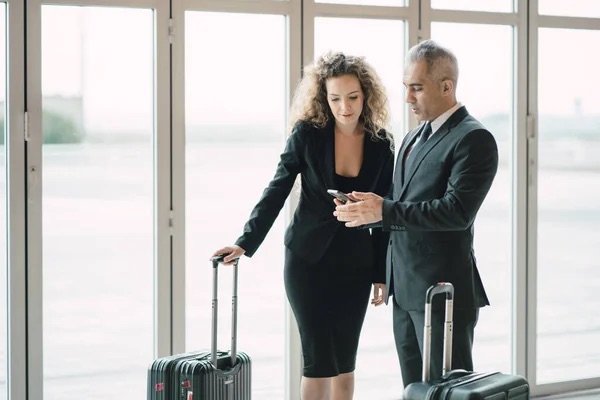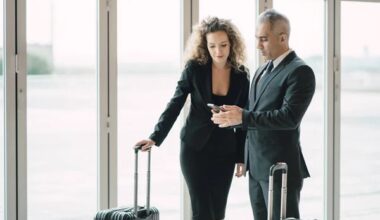Politeness goes a long way in making travel experiences positive and pleasant for everyone involved. Knowing how to phrase travel requests politely in English can be particularly helpful, especially in situations where you need assistance or are navigating unfamiliar environments.
Using polite language in hotels, airports, restaurants, or public transport not only reflects respect but also makes it more likely that you’ll receive helpful responses. Below, you’ll find the most useful polite travel requests, with examples and practical scenarios to make them easy to remember and use on your next trip.
Polite Travel Requests in English
- “Could you please help me with my luggage?”
- “May I have a window/aisle seat, if available?”
- “Could I have a late check-out, please?”
- “Would you mind showing me where the restroom is?”
- “Could you recommend a good local restaurant?”
- “May I have the bill, please?”
- “Could you arrange an airport transfer for me?”
- “Would it be possible to get a quieter room?”
- “Can you confirm my reservation, please?”
- “Would you be able to call a taxi for me?”
- “Could you tell me the best way to get to [location]?”
- “Could I see a menu in English, please?”
- “Would it be okay if I have extra towels?”
- “Could you help me with directions to the museum?”
- “Would you mind storing my luggage for a few hours?”
- “Could you let me know when my room is ready?”
- “May I have some extra blankets, please?”
- “Could I have an upgrade if there’s availability?”
- “Would it be possible to get a Wi-Fi code?”
- “Could you explain the menu options to me, please?”
Practical Scenarios Using Polite Travel Requests
1. Requesting Help with Luggage
Managing luggage, especially during a busy travel schedule, can be challenging. Asking politely for assistance helps ease the process and makes others more likely to lend a hand.
- Example:
“Could you please help me with my luggage?” - Scenario:
You’ve just arrived at your hotel, and the reception area is a bit busy. Politely asking the staff, “Could you please help me with my luggage?” shows courtesy and makes it clear that you need assistance without seeming demanding.
2. Requesting a Preferred Seat on a Flight
Seating preferences can impact comfort, especially on long flights. Phrasing your request politely increases your chances of getting your desired seat if available.
- Example:
“May I have a window aisle seat, if available?” - Scenario:
During check-in, you can ask the agent, “May I have a window seat, if available?” Even if seats are limited, the politeness of your request could encourage the agent to help you if possible.
3. Asking for a Late Check-Out
Sometimes your schedule requires a bit more time in your hotel room. Requesting a late check-out politely can often lead to a positive response.
- Example:
“Could I have a late check-out, please?” - Scenario:
On your check-out day, you realise you need an extra hour to pack. A polite request like, “Could I have a late check-out, please?” shows you respect hotel policies and may increase the chances of an extension.
4. Finding the Restroom Politely
When you’re in a new place, it’s often necessary to ask where the restroom is. Being polite about it is always a good idea.
- Example:
“Would you mind showing me where the restroom is?” - Scenario:
At a crowded café in Paris, you ask the waiter, “Would you mind showing me where the restroom is?” The polite tone conveys respect, making them more likely to assist.
5. Requesting Local Restaurant Recommendations
Getting insider tips from locals can lead to some of the best dining experiences.
- Example:
“Could you recommend a good local restaurant?” - Scenario:
At the hotel reception, you politely ask, “Could you recommend a good local restaurant?” This phrase shows openness to their opinion, and they’re likely to suggest authentic spots.
6. Politely Asking for the Bill
When it’s time to pay, asking for the bill politely shows respect for the service staff.
- Example:
“May I have the bill, please?” - Scenario:
After dining at a restaurant, saying “May I have the bill, please?” rather than signalling or demanding it sets a polite tone and ends your meal on a courteous note.
7. Arranging an Airport Transfer
If you need to get to the airport on time, arranging a transfer through your hotel can be helpful.
- Example:
“Could you arrange an airport transfer for me?” - Scenario:
You’re checking out early and need reliable transport. By saying, “Could you arrange an airport transfer for me?” you make your request clearly and respectfully.
8. Requesting a Quieter Room
If your room is too noisy, asking for a quieter one politely shows respect for the staff’s efforts to accommodate you.
- Example:
“Would it be possible to get a quieter room?” - Scenario:
After a noisy first night, you approach the front desk and say, “Would it be possible to get a quieter room?” This polite request shows understanding if they’re unable to immediately fulfil your request.
9. Confirming a Reservation
Confirming your booking ensures that your travel plans are on track.
- Example:
“Can you confirm my reservation, please?” - Scenario:
A day before your stay, calling the hotel and saying, “Can you confirm my reservation, please?” is both polite and professional, and staff are likely to respond positively.
10. Calling a Taxi
Arranging transportation is often necessary, and asking for help can make it easier.
- Example:
“Would you be able to call a taxi for me?” - Scenario:
After a business meeting, you need quick transportation. Politely saying, “Would you be able to call a taxi for me?” makes your request sound courteous.
11. Asking for Directions
Getting directions politely can lead to helpful, friendly responses.
- Example:
“Could you tell me the best way to get to [location]?” - Scenario:
You’re unsure about how to reach a nearby museum. Asking a local, “Could you tell me the best way to get to the museum?” shows respect and invites them to share insider tips.
12. Requesting an English Menu
In non-English-speaking countries, asking for an English menu can help you order with confidence.
- Example:
“Could I see a menu in English, please?” - Scenario:
At a café in Rome, you ask, “Could I see a menu in English, please?” to make your ordering experience easier. This polite phrase shows cultural sensitivity.
13. Asking for Extra Towels
Sometimes you may need additional items in your hotel room. Asking politely makes it likely that your request will be accommodated quickly.
- Example:
“Would it be okay if I have extra towels?” - Scenario:
You need an extra towel for the evening. Saying, “Would it be okay if I have extra towels?” sounds polite, and the staff will likely assist promptly.
14. Getting Directions to a Museum
When sightseeing, asking locals for directions can be very helpful.
- Example:
“Could you help me with directions to the museum?” - Scenario:
You’re lost and approach a shop owner, saying, “Could you help me with directions to the museum?” The polite tone often encourages locals to help.
15. Storing Luggage After Check-Out
If you’re checking out but still want to explore, politely asking the hotel to store your luggage can be convenient.
- Example:
“Would you mind storing my luggage for a few hours?” - Scenario:
You check out at 11 a.m. but have an evening flight. Asking, “Would you mind storing my luggage for a few hours?” allows you to continue exploring without baggage.
16. Asking When Your Room Will Be Ready
If you arrive early, finding out when your room will be available politely is often helpful.
- Example:
“Could you let me know when my room is ready?” - Scenario:
You arrive at your hotel in the morning. Politely asking, “Could you let me know when my room is ready?” gives the staff flexibility while keeping you informed.
17. Requesting Extra Blankets
Extra amenities can make your stay more comfortable, and asking politely is the best way to request them.
- Example:
“May I have some extra blankets, please?” - Scenario:
The room is colder than expected
18. Politely Asking for an Upgrade
Sometimes, if there’s availability, hotels may offer room upgrades. Asking politely can improve your chances of enjoying a better room.
- Example Phrase:
“Could I have an upgrade if there’s availability?” - Scenario:
At check-in, if you’re celebrating a special occasion, you might say, “Could I have an upgrade if there’s availability?” This polite request respects the hotel’s discretion while subtly indicating your interest.
19. Requesting the Wi-Fi Code
Staying connected is crucial while travelling, and politely asking for Wi-Fi access shows respect for the service.
- Example Phrase:
“Would it be possible to get a Wi-Fi code?” - Scenario:
After settling into your hotel room, ask at the front desk, “Would it be possible to get a Wi-Fi code?” This courteous phrase is a simple way to inquire about a service offered by most hotels.
20. Asking for Menu Explanations
In new destinations, local dishes can sometimes be unfamiliar. Politely asking for explanations can help you make informed choices.
- Example Phrase:
“Could you explain the menu options to me, please?” - Scenario:
Dining at a local restaurant, you see unfamiliar items on the menu. Saying, “Could you explain the menu options to me, please?” shows curiosity and respect for local cuisine, and the staff will likely be happy to assist.
Conclusion
Using polite travel requests in English can transform your travel experience, making each interaction smoother and more enjoyable.
Whether it’s asking for directions, requesting an upgrade, or simply ordering a meal, these courteous phrases make a great impression.
Next time you’re traveling, try incorporating these polite requests, and notice how your interactions become more positive and helpful.







